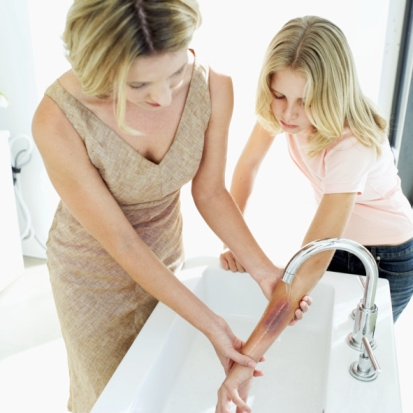2/4/13 news article
keeping our kids burn free
supervise your children

Winter is a time for cold weather, snow, sweaters, and coats, but it’s also a time for hot chocolate, space heaters, and soup. Anyone can be at risk for a serious burn when distracted or not careful. It is important to teach your child safety around hot items in order to prevent burns. During National Burn Awareness Week (February 3-9, 2013), Dayton Children’s and Safe Kids Greater Dayton remind parents and caregivers that fire is just one cause of burn injuries and that it is extrememly important to supervise and educate children to avoid burns.
The most common burns affecting young children are from hot water. During the winter months, we often use hot water for cooking and making hot chocolate. Hot tap water accounts for nearly 1 in 4 of all scald burns among children and is associated with more hospitalizations and fatalities than any other hot liquid burn.
“A new trend we've seen in the last few years is parents using the stove to heat bath water because their electricity has been turned off,” says Lisa Schwing, Dayton Children’s trauma program manager. “Parents are dumping one pot at a time and while they are going to the kitchen for more, the unsupervised child falls in or climbs in the scalding water.”
Another large cause of burns is unsupervised cooking. Experts at Dayton Children’s suggest taking caution when making instant soup. The soup containers have been found to be extremely dangerous because of how they are designed. Noodles from soup can stick to the skin if spilled, which leads to a more serious burn. Many children with noodle soup burns end up needing surgery. Permanent scaring can also result from any type of burn as well as receiving limited mobility in your joints.
“We could make a significant reduction in kids treated for scald burns if the kids weren’t using the microwave to cook meals after school” says Schwing.
burn prevention tips:
- Keep hot foods and drinks away from the edge of tables and counters. Do not put them on a tablecloth that little hands can yank.
- If you're holding something hot, don't hold your child too.
- When you cook, keep your child away from the stove. Tell children that when you are cooking you are not to be bothered.
- Turn pot handles toward the back of the stove. If possible, use rear burners.
- Watch for dangling appliance cords.
- Prepare non-microwaveable snacks if children are not fully supervised.
- Test heated food and liquids before serving children.
- Always check the water temperature before placing your child in the tub. A child's skin burns more easily than an adult's.
If it’s too late…
- Remove the hot, wet clothing—don't forget to check and remove an infant's diaper if it has absorbed hot liquids.
- Cool the burned area immediately with room-temperature tap water.
- Do not use ice or very cold water. Ice or very cold water will further damage burned skin.
- Cooling should only take a few minutes. Do not over-cool the area. Carefully touch the burned area. When the burned area is the temperature of the unburned skin, you have cooled enough.
- Gently dry the area and cover burn with a clean, dry bandage or towel.
- Do not use butter, first aid ointment or burn cream. These items tend to retain heat and cause more pain.
- Keep the burned victim warm while you transport them to hospital or wait for emergency services to arrive. Cover with a blanket. Burned skin loses body heat rapidly—even in warmer months.
It is very important to never underestimate a burn. Seeking medical assistance from your physician could really benefit you and your child. Dayton Children’s offers prestigious burn care such as:
- Clinical care for burns
- Multidisciplinary consultation as needed
- Inpatient and outpatient burn education
- In-room amenities for families needing to stay the night
- Community burn prevention education for local schools and daycare centers throughout the greater Dayton area
About Safe Kids Greater Dayton
Safe Kids Greater Dayton works to prevent accidental childhood injury, the leading killer of children 14 and younger. Safe Kids Greater Dayton is a member of Safe Kids Worldwide, a global network of organizations dedicated to preventing accidental injury. Safe Kids Greater Dayton was founded in 1994 and is led by The Children’s Medical Center of Dayton.
For more information, contact:
Jessica Saunders
Injury Prevention Coordinator
Phone: 937-641-3666
marketing@childrensdayton.org

